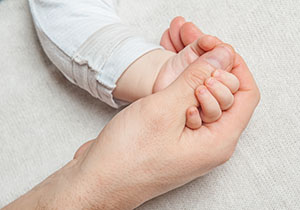Per one mom: “I carry a light-weight blanket when I travel with my breast-fed infant. If someone seems bothered by my nursing – even though I do it discreetly – I offer them the blanket so they can cover their eyes.”

There is no reason to curtail your travel plans because you breast-feed. Stories that travel-related stress significantly interferes with milk flow are hearsay. In fact, the alternative, bottle-feeding, is a bigger hassle, requiring you to carry formula, bottles and paraphernalia for sterilization, for example. (However, most experts say that sterilizing bottles and nipples is necessary only where sanitation is very poor.) Until infants are six months of age, exclusive breast-feeding is recommended, negating the use of solid food – which also can be problematic where sanitation is poor.
Restriction on breast-feeding in public, once common in the US, is now legal in 47 states and the District of Columbia. Two of the three remaining states, South Dakota and Virginia, exempt breast-feeding women from indecency and nudity laws, making breast-feeding legal. Idaho is the only state that has no laws regarding breast-feeding in public. Outside the U.S., attitudes for breast-feeding in public are far more relaxed with few, if any, restrictions. No airline restricts breast-feeding.
 Many mothers are wrongly advised to discontinue breast-feeding for travel-related issues. Limitations on breast-feeding generally come from people, including health care professionals, who are overly cautious and not familiar with the latest findings, says the American Academy of Pediatrics. Check with lactation and travel medicine practitioners. For information on medications and breast-feeding, go to LactMed.
Many mothers are wrongly advised to discontinue breast-feeding for travel-related issues. Limitations on breast-feeding generally come from people, including health care professionals, who are overly cautious and not familiar with the latest findings, says the American Academy of Pediatrics. Check with lactation and travel medicine practitioners. For information on medications and breast-feeding, go to LactMed.
Check with your health care providers back home if you become ill while traveling. Routine illnesses virtually never require discontinuing nursing. However, being away from home, especially being overseas, tends to make illnesses seem worse than they are. Your own health care providers usually can advise you if you need to take medication or to seek medical care – or do nothing, which increasingly is the suggested cure for most minor illnesses. Carry your providers’ telephone numbers. Virtually all over-the-counter medications are safe while nursing.
 Be fully vaccinated. Both mother and infant. Most vaccines given to mothers do not protect their infants; infants need their own age-appropriate vaccines. Only one vaccine, for preventing yellow fever, is contraindicated while nursing. This disease is limited to mostly rural areas of tropical Africa and South America. The vaccine can cause serious problems for young infants. Neither mother nor infant should receive this vaccine if the infant is less than nine months of age. Consult a travel medicine professional.
Be fully vaccinated. Both mother and infant. Most vaccines given to mothers do not protect their infants; infants need their own age-appropriate vaccines. Only one vaccine, for preventing yellow fever, is contraindicated while nursing. This disease is limited to mostly rural areas of tropical Africa and South America. The vaccine can cause serious problems for young infants. Neither mother nor infant should receive this vaccine if the infant is less than nine months of age. Consult a travel medicine professional.
Overseas travel may also require changes is preventative medications. Malaria, for example, exists in large areas of tropical Central and South America, Africa, and Southeast Asia. Malaria can affect infants beginning at birth. Anti-malarial medications given to mothers do not pass through breast milk. Infants need their own medication, which may be different from that given to adults. Consult a professional.
 Air travel. At US airports, inform security agents if you are carrying expressed breast milk in excess of the allowable 3.4 ounces (100 millimeters) for liquids. If yes, the milk will be X-rayed – which does not harm the milk. If you prefer that the expressed milk not be X-rayed, agents will pour a small amount into a container to be examined for prohibited substances. Ice packs and breast pumps are allowed in carry-on luggage. Rules governing security issues may change and vary overseas. The latest US information is available at www.tsa.gov/traveling-formula-breast-milk-and-juice.
Air travel. At US airports, inform security agents if you are carrying expressed breast milk in excess of the allowable 3.4 ounces (100 millimeters) for liquids. If yes, the milk will be X-rayed – which does not harm the milk. If you prefer that the expressed milk not be X-rayed, agents will pour a small amount into a container to be examined for prohibited substances. Ice packs and breast pumps are allowed in carry-on luggage. Rules governing security issues may change and vary overseas. The latest US information is available at www.tsa.gov/traveling-formula-breast-milk-and-juice.
Never breast-feed infants in moving cars. Infants should be securely restrained at all times – as should adults, making safe nursing virtually impossible. For example: An unrestrained mother is nursing her infant in a car going about 40 miles (63 kilometers) per an hour. The car hits another car. In a millisecond, the infant becomes the equivalent of a missile weighing hundreds of pounds and flies forward at about 40 miles per hour.
 Travel with an infant-carrying sling. Slings help maintain breast-feeding by allowing opportunities for unrestricted nursing, help protect infants from surrounding hazards, ease the burden of carrying the infant and, because slings free the hands, simplify many travel-related tasks (boarding an airplane, for example).
Travel with an infant-carrying sling. Slings help maintain breast-feeding by allowing opportunities for unrestricted nursing, help protect infants from surrounding hazards, ease the burden of carrying the infant and, because slings free the hands, simplify many travel-related tasks (boarding an airplane, for example).
Miscellaneous. The use of sunscreens and insect repellents by mothers has no adverse effects on the infant. However check the web regarding the use of these substances on the infant. No need for mothers to drink extra fluid during air travel. Dehydration during air travel is a myth. And no need for nursing mothers to offer infants extra fluids in hot weather. Breast-feeding suffices.

